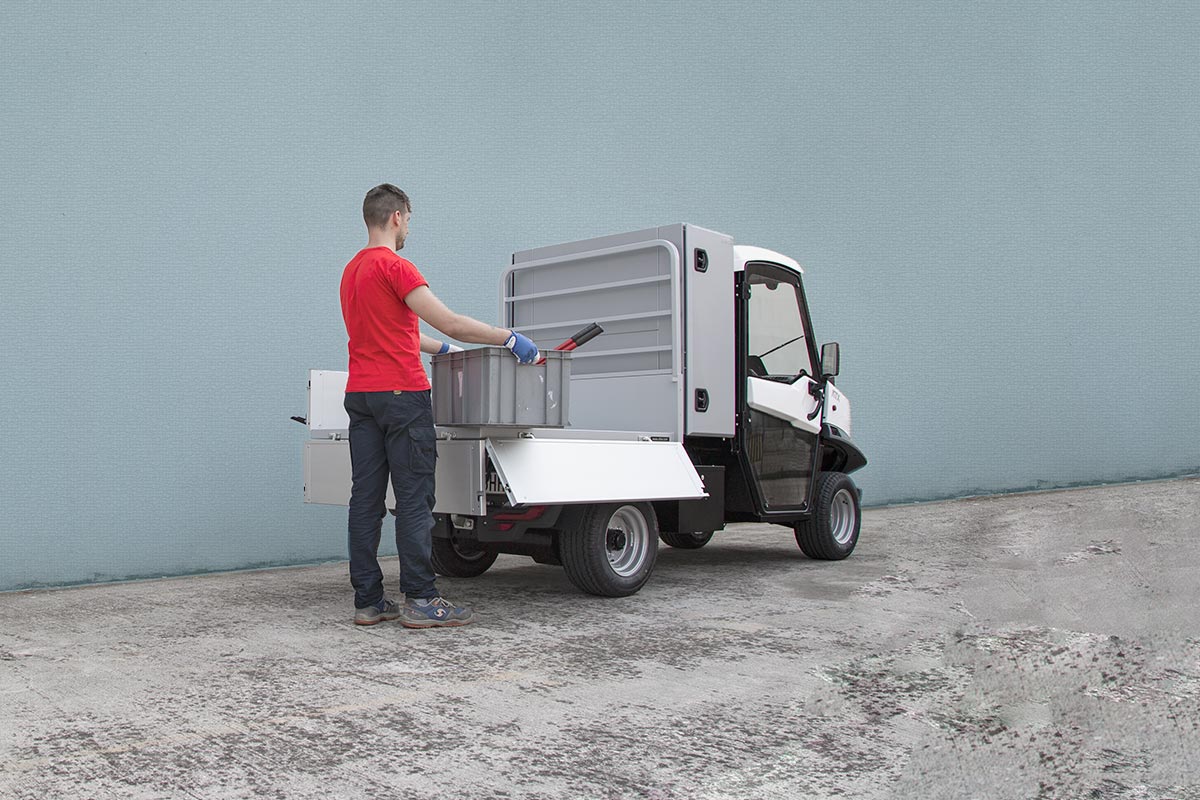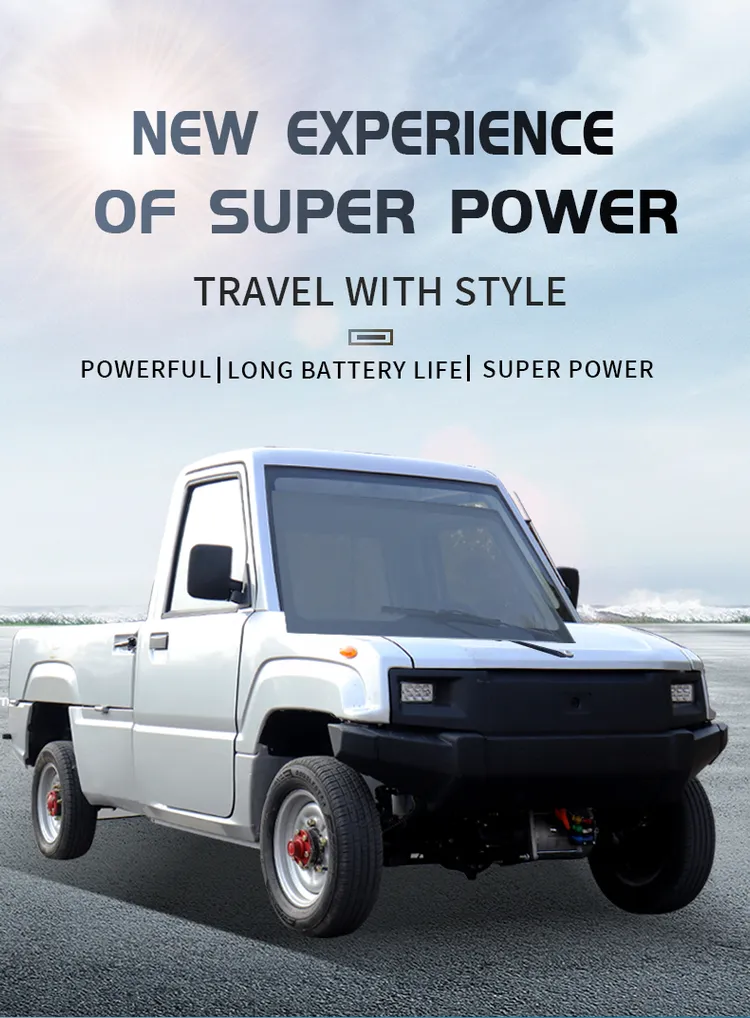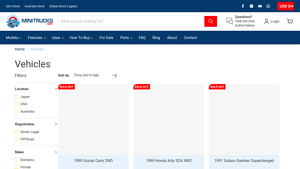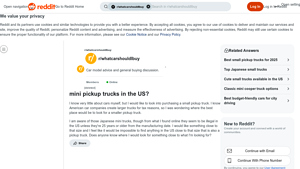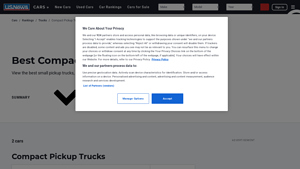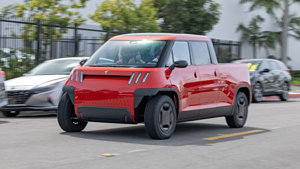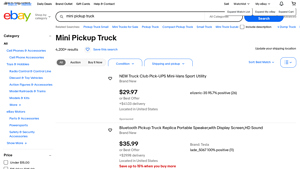Introduction: Navigating the Global Market for mini pickup truck
In an increasingly competitive landscape, sourcing the right mini pickup truck can be a daunting challenge for international B2B buyers. From agricultural operations in Nigeria to urban logistics in Vietnam, the versatility and compactness of mini pickup trucks make them an appealing choice for various applications. However, navigating the complexities of different models, supplier reliability, and pricing structures can overwhelm even the most seasoned buyers. This guide aims to demystify the global market for mini pickup trucks, providing insights into the various types available, their practical applications, and essential criteria for supplier vetting.
In this comprehensive resource, we will explore popular models, including the highly regarded Daihatsu Hijet and Suzuki Carry, alongside the emerging electric options such as the TELO MT1, which are reshaping urban transportation. Additionally, we will address cost considerations, financing options, and customization opportunities that can cater to unique business needs. By equipping buyers with actionable insights, this guide empowers stakeholders from Africa, South America, the Middle East, and Europe to make informed purchasing decisions that align with their operational requirements and budget constraints. Ultimately, understanding the nuances of the mini pickup truck market will enable businesses to optimize their logistics and enhance their service delivery.
Understanding mini pickup truck Types and Variations
| Type Name | Key Distinguishing Features | Primary B2B Applications | Brief Pros & Cons for Buyers |
|---|---|---|---|
| Kei Truck | Compact size, lightweight, 660cc engine limit | Agriculture, small business delivery | Pros: Cost-effective, fuel-efficient; Cons: Limited cargo capacity. |
| Electric Mini Truck | All-electric, eco-friendly, advanced safety features | Urban logistics, green initiatives | Pros: Low operational costs, zero emissions; Cons: Higher upfront costs, charging infrastructure needed. |
| Jumbo Cab Mini Truck | Extended cab for more passenger and cargo space | Construction, service industries | Pros: Versatile seating and storage; Cons: Larger footprint may limit maneuverability. |
| 4WD Mini Truck | Four-wheel drive, off-road capabilities | Construction, outdoor services | Pros: Excellent traction, ruggedness; Cons: Heavier fuel consumption. |
| Dump Mini Truck | Built-in dump bed for easy unloading | Landscaping, construction | Pros: Efficient for bulk material transport; Cons: Limited versatility outside of dumping tasks. |
What are the Key Characteristics of Kei Trucks for B2B Buyers?
Kei trucks are compact vehicles designed primarily for the Japanese market, characterized by their small size and lightweight structure, adhering to a 660cc engine limit. These trucks excel in urban settings and rural areas, making them ideal for agricultural purposes, small business deliveries, and local logistics. B2B buyers should consider their cost-effectiveness and fuel efficiency, although the limited cargo capacity may restrict their use in larger operations.
How Do Electric Mini Trucks Meet Modern Business Needs?
Electric mini trucks, like the TELO MT1, offer an eco-friendly alternative for businesses looking to reduce their carbon footprint. These vehicles are designed with advanced safety features and can handle urban logistics effectively, making them suitable for green initiatives. While they have a higher upfront cost and require a charging infrastructure, their low operational costs and zero emissions can lead to significant savings and sustainability for B2B operations.
Why Choose Jumbo Cab Mini Trucks for Versatility?
Jumbo cab mini trucks provide extended cab space, allowing for additional passengers and cargo. This versatility makes them particularly useful in construction and service industries where transporting teams and equipment simultaneously is crucial. Buyers should weigh the benefits of increased seating and storage against the potential challenges of maneuverability in tight spaces due to their larger footprint.
What Advantages Do 4WD Mini Trucks Offer for Outdoor Applications?
4WD mini trucks are equipped for off-road capabilities, making them an excellent choice for businesses in construction and outdoor services. Their rugged design provides superior traction and stability on uneven terrain. However, B2B buyers should be mindful of the increased fuel consumption associated with these vehicles, as it may impact overall operational costs.
How Do Dump Mini Trucks Enhance Efficiency in Material Transport?
Dump mini trucks are specifically designed with built-in dump beds, streamlining the process of unloading bulk materials. They are particularly beneficial in landscaping and construction, where quick and efficient material transport is essential. While they excel in dumping tasks, their versatility may be limited compared to other mini truck types, which could influence purchasing decisions based on specific operational needs.
Key Industrial Applications of mini pickup truck
| Industry/Sector | Specific Application of mini pickup truck | Value/Benefit for the Business | Key Sourcing Considerations for this Application |
|---|---|---|---|
| Agriculture | Transporting tools and produce on farms | Increases efficiency in logistics and reduces labor costs | Durability, off-road capability, and payload capacity |
| Construction | Hauling materials to job sites | Enhances productivity by enabling quick material transport | Load capacity, engine power, and ease of maneuverability |
| Hospitality & Tourism | Shuttle service for guests in resorts | Provides a unique and memorable experience for guests | Comfort, aesthetics, and passenger capacity |
| Retail & Delivery | Last-mile delivery of goods | Streamlines operations and enhances customer satisfaction | Fuel efficiency, cargo space, and reliability |
| Municipal Services | Waste collection and urban maintenance | Cost-effective solution for city maintenance operations | Low maintenance cost, compact design, and versatility |
How Are Mini Pickup Trucks Used in Agriculture and What Problems Do They Solve?
In the agriculture sector, mini pickup trucks serve as essential tools for transporting tools, equipment, and produce across farms. Their compact size allows them to navigate narrow pathways and rough terrains, which is particularly beneficial in regions with less developed infrastructure. By reducing the need for multiple trips and minimizing labor costs, these vehicles significantly enhance operational efficiency. Buyers in this sector should prioritize durability, off-road capability, and adequate payload capacity to ensure these trucks meet the demands of their agricultural tasks.
What Role Do Mini Pickup Trucks Play in Construction?
In construction, mini pickup trucks are invaluable for hauling materials like lumber, cement, and tools to job sites. Their versatility allows construction companies to transport heavy loads without the need for larger, more expensive vehicles. This not only improves productivity but also reduces transportation costs. When sourcing, businesses should focus on load capacity, engine power, and ease of maneuverability to ensure the truck can handle the varied demands of construction environments.
How Can Mini Pickup Trucks Enhance Hospitality and Tourism?
Mini pickup trucks are increasingly utilized in the hospitality and tourism industry for providing shuttle services within resorts and parks. They offer a unique experience for guests, allowing them to explore vast areas comfortably. The compact design allows for easy navigation in crowded or narrow spaces. Buyers should consider comfort, aesthetics, and passenger capacity to ensure that the vehicles enhance the guest experience while meeting operational needs.
How Do Mini Pickup Trucks Improve Retail and Delivery Operations?
In the retail sector, mini pickup trucks are ideal for last-mile delivery of goods. Their smaller footprint allows them to navigate urban environments more easily than larger vehicles, making them perfect for reaching customers in congested areas. By streamlining operations and enhancing customer satisfaction through timely deliveries, these trucks play a crucial role in modern retail logistics. Key sourcing considerations include fuel efficiency, cargo space, and reliability to ensure that the vehicle performs well in demanding delivery scenarios.
What Benefits Do Mini Pickup Trucks Offer Municipal Services?
Municipal services benefit greatly from the use of mini pickup trucks for tasks such as waste collection and urban maintenance. These vehicles are cost-effective solutions that help cities maintain cleanliness and order efficiently. Their compact design allows for easy maneuvering in tight spaces, which is essential in urban environments. When sourcing, municipalities should look for low maintenance costs, versatility, and a compact design to maximize the utility of these vehicles in city operations.
3 Common User Pain Points for ‘mini pickup truck’ & Their Solutions
Scenario 1: Struggling with Limited Payload Capacity for Heavy Loads
The Problem:
B2B buyers often face the challenge of payload capacity when using mini pickup trucks for transporting heavy materials or equipment. For instance, construction companies in regions like Africa and South America might require vehicles to transport tools and building materials, but they find that many mini trucks do not meet their payload requirements. This limitation can lead to inefficiencies, increased costs due to multiple trips, and delays in project timelines.
The Solution:
To overcome this issue, it is essential for buyers to carefully evaluate the payload specifications of mini pickup trucks before making a purchase. Look for models that offer higher payload capacities, such as the Daihatsu Hijet or Suzuki Carry, which are known for their robust performance. Additionally, consider investing in customized configurations that enhance the truck’s capacity, such as reinforced beds or additional suspension support. Establishing relationships with suppliers who offer customization services can also ensure the vehicle meets specific operational needs.
Scenario 2: Navigating Regulatory Hurdles and Import Restrictions
The Problem:
International buyers, particularly in regions like the Middle East and Europe, often encounter regulatory hurdles when importing mini pickup trucks. These can include stringent emissions standards, safety regulations, and paperwork requirements that complicate the import process. This not only results in delays but can also incur additional costs if the vehicles need modifications to comply with local laws.
The Solution:
To navigate these regulatory challenges, buyers should conduct thorough research on the specific import regulations in their country. Engaging with local automotive experts or legal consultants who specialize in vehicle imports can provide valuable insights. It’s advisable to choose mini trucks that are already compliant with international standards, as this can significantly reduce modification costs. Additionally, working with reputable suppliers who have experience with export procedures can streamline the process, ensuring all documentation is correctly handled from the outset.
Scenario 3: Finding Reliable After-Sales Support and Parts Availability
The Problem:
After purchasing a mini pickup truck, many B2B buyers are concerned about the availability of after-sales support and spare parts, especially in remote areas. Businesses in rural regions may rely on these vehicles for daily operations, and any downtime due to mechanical issues can severely impact productivity and profitability. Without reliable access to parts and service, buyers may feel apprehensive about the long-term viability of their investment.
The Solution:
To mitigate these concerns, buyers should prioritize sourcing mini pickup trucks from manufacturers or dealers that offer robust after-sales support. Research the availability of spare parts in local markets and consider vehicles that have established networks for maintenance services. Engaging in discussions with other businesses in the region can also provide insights into the reliability of specific brands. Additionally, consider establishing a maintenance contract with a local service provider to ensure regular check-ups and prompt repairs, thus minimizing downtime and ensuring that the vehicle remains operational for as long as possible.
Strategic Material Selection Guide for mini pickup truck
When selecting materials for mini pickup trucks, it is vital to consider the performance characteristics, cost implications, and regional compliance standards that influence the manufacturing process and end-user experience. Below is an analysis of four common materials used in the production of mini pickup trucks, focusing on their properties, advantages, disadvantages, and specific considerations for international B2B buyers.
What Are the Key Properties of Steel for Mini Pickup Trucks?
Steel is a primary material in the automotive industry due to its strength and versatility. It typically exhibits high tensile strength, excellent ductility, and good weldability, making it suitable for structural components and body panels. Steel’s corrosion resistance can be enhanced through galvanization, which is particularly relevant in regions with high humidity or saline environments.
Pros and Cons of Using Steel
Steel provides exceptional durability and impact resistance, making it ideal for rugged applications. However, it is relatively heavy, which can affect fuel efficiency and payload capacity. The manufacturing complexity is moderate, as steel components often require stamping and welding processes.
Impact on Application
Steel is compatible with various media and can withstand high temperatures and pressures, making it suitable for engine components and structural frameworks.
Considerations for International Buyers
Buyers from regions like Africa and South America should ensure compliance with local standards such as ASTM or JIS for steel quality. The cost of steel can fluctuate based on global market trends, so understanding local sourcing options is crucial.
How Does Aluminum Compare as a Material for Mini Pickup Trucks?
Aluminum is increasingly used in mini pickup trucks due to its lightweight properties, which contribute to improved fuel efficiency and handling. It offers good corrosion resistance and thermal conductivity, making it suitable for components exposed to harsh environments.
Pros and Cons of Using Aluminum
The primary advantage of aluminum is its low weight, which enhances the vehicle’s performance and payload capacity. However, aluminum can be more expensive than steel and may require specialized welding techniques, increasing manufacturing complexity.
Impact on Application
Aluminum’s corrosion resistance makes it ideal for applications in coastal regions or areas with high rainfall. Its lightweight nature allows for a larger payload without compromising structural integrity.
Considerations for International Buyers
Buyers in Europe and the Middle East may prefer aluminum for its sustainability benefits, as it is 100% recyclable. Compliance with European standards for aluminum alloys is essential for ensuring product quality.
What Role Does Plastic Play in Mini Pickup Truck Manufacturing?
Plastics are commonly used in mini pickup trucks for interior components, bumpers, and body panels. They are lightweight and can be molded into complex shapes, providing design flexibility.
Pros and Cons of Using Plastic
Plastics are cost-effective and offer excellent resistance to corrosion and chemical exposure. However, they may not provide the same level of impact resistance as metals, which could be a concern in off-road applications.
Impact on Application
Plastics are suitable for non-structural components and can withstand various environmental conditions, making them ideal for interior applications.
Considerations for International Buyers
International buyers should be aware of regulations regarding plastic materials, especially in Europe, where there are strict guidelines on recyclability and sustainability. Understanding local preferences for materials can also guide purchasing decisions.
Why Is Composite Material Gaining Popularity in Mini Pickup Trucks?
Composite materials, such as fiberglass and carbon fiber, are gaining traction in the automotive sector due to their high strength-to-weight ratio and design flexibility. They are particularly beneficial in applications where weight reduction is critical.
Pros and Cons of Using Composite Materials
The main advantage of composites is their lightweight nature, which significantly improves fuel efficiency. However, they are generally more expensive than traditional materials and can complicate the manufacturing process due to their specialized handling requirements.
Impact on Application
Composites are ideal for aerodynamic body panels and components that require high strength with minimal weight. They also offer excellent resistance to corrosion and environmental degradation.
Considerations for International Buyers
Buyers should consider the availability of composite materials in their regions, as they may not be as widely sourced as steel or aluminum. Compliance with international standards for composites is also essential for quality assurance.
Summary Table of Material Selection for Mini Pickup Trucks
| Material | Typical Use Case for mini pickup truck | Key Advantage | Key Disadvantage/Limitation | Relative Cost (Low/Med/High) |
|---|---|---|---|---|
| Steel | Structural components, body panels | High strength and durability | Heavy, affects fuel efficiency | Medium |
| Aluminum | Engine components, body panels | Lightweight, corrosion-resistant | Higher cost, requires special welding | High |
| Plastic | Interior components, bumpers | Cost-effective, design flexibility | Lower impact resistance | Low |
| Composite | Aerodynamic body panels, lightweight parts | High strength-to-weight ratio | Expensive, complex manufacturing | High |
This strategic material selection guide provides valuable insights for international B2B buyers, enabling them to make informed decisions based on performance, cost, and regional compliance considerations.
In-depth Look: Manufacturing Processes and Quality Assurance for mini pickup truck
What Are the Main Stages of Manufacturing Mini Pickup Trucks?
The manufacturing process of mini pickup trucks involves several critical stages, each ensuring that the final product meets both performance and quality expectations. The main stages include material preparation, forming, assembly, and finishing.
How Is Material Prepared for Mini Pickup Truck Manufacturing?
Material preparation is the foundational step in the manufacturing process. High-quality materials, such as steel, aluminum, and various composites, are sourced to ensure durability and performance. These materials undergo rigorous inspections upon arrival to verify compliance with industry standards. Suppliers often provide material certificates that confirm the specifications, which is vital for international buyers to ensure they receive the quality promised.
What Techniques Are Used in the Forming Stage?
Once materials are approved, the forming stage begins, which involves shaping these materials into the necessary components of the mini pickup truck. Key techniques include stamping, molding, and welding. Stamping is often used for metal sheets to create body panels, while molding is utilized for plastic parts, such as bumpers and interior components. Robotic welding systems enhance precision and reduce human error, ensuring consistent quality across all units produced.
How Does the Assembly Process Work for Mini Pickup Trucks?
The assembly stage combines all manufactured components into a complete mini pickup truck. This process typically follows a sequential line where each station is responsible for specific tasks, such as installing the drivetrain, electrical systems, and interior finishes. Lean manufacturing principles are often employed to minimize waste and enhance efficiency, which is crucial for meeting production targets while maintaining quality.
What Are the Key Quality Assurance Practices in Mini Pickup Truck Manufacturing?
Quality assurance (QA) is integral to the manufacturing of mini pickup trucks. It encompasses various practices designed to maintain high standards throughout the production process.
Which International Standards Should B2B Buyers Be Aware Of?
Many manufacturers adhere to international standards, such as ISO 9001, which focuses on quality management systems. Compliance with these standards assures buyers that the manufacturer has robust processes to ensure quality. Additionally, industry-specific certifications like CE (Conformité Européenne) for the European market or API (American Petroleum Institute) for components related to engines and emissions may be required based on regional regulations.
What Are the QC Checkpoints During Production?
Quality control checkpoints are critical in the manufacturing process. These typically include:
- Incoming Quality Control (IQC): This involves inspecting raw materials and components upon delivery to ensure they meet specified requirements.
- In-Process Quality Control (IPQC): Continuous monitoring during the production process allows for immediate identification and correction of defects.
- Final Quality Control (FQC): Once the assembly is complete, a final inspection is conducted to verify that the mini pickup truck meets all specifications and quality standards.
What Common Testing Methods Are Used for Mini Pickup Trucks?
Testing methods are essential to verify the quality and reliability of mini pickup trucks. Common approaches include:
- Durability Testing: This assesses the vehicle’s ability to withstand wear and tear under various conditions.
- Crash Testing: Essential for safety, this evaluates how well the vehicle protects occupants in the event of an accident.
- Performance Testing: This includes evaluating acceleration, braking, and handling to ensure the truck performs as expected.
How Can B2B Buyers Verify Supplier Quality Control?
B2B buyers must take proactive steps to verify the quality control measures of their suppliers. One effective approach is to conduct audits of the manufacturing facilities. These audits can reveal the operational processes and quality assurance practices in place. Additionally, requesting detailed quality assurance reports from suppliers can provide insights into their compliance with international standards.
Engaging third-party inspection services can also offer an unbiased assessment of the manufacturer’s quality control processes. These inspections can be particularly beneficial for international buyers who may face language barriers or different regulatory environments.
What Are the Quality Control Nuances for International B2B Buyers?
International buyers, particularly from regions like Africa, South America, the Middle East, and Europe, must be aware of specific quality control nuances. These may include understanding local regulations regarding vehicle emissions, safety standards, and import tariffs that can affect compliance and costs.
Moreover, it is essential to establish clear communication channels with suppliers to address any concerns regarding quality expectations. Cultural differences can impact negotiations and quality perceptions, making it crucial for buyers to be well-informed about the supplier’s practices and regional standards.
Conclusion: Ensuring Quality in Mini Pickup Truck Manufacturing
In summary, the manufacturing processes and quality assurance practices for mini pickup trucks are multifaceted and highly regulated. Understanding these processes is vital for B2B buyers to ensure they receive products that meet their quality standards and regulatory requirements. By focusing on robust manufacturing stages, adhering to international standards, and implementing thorough quality control measures, suppliers can deliver reliable and efficient mini pickup trucks that meet the diverse needs of global markets.
Practical Sourcing Guide: A Step-by-Step Checklist for ‘mini pickup truck’
Introduction
This guide serves as a practical checklist for B2B buyers seeking to procure mini pickup trucks. With a growing demand for efficient, compact vehicles across various industries, particularly in regions like Africa, South America, the Middle East, and Europe, understanding the procurement process is essential. This checklist will help you navigate the complexities of sourcing mini pickup trucks, ensuring you make informed decisions that align with your operational needs.
Step 1: Define Your Technical Specifications
Establishing clear technical specifications is the foundation of your sourcing process. Consider factors such as payload capacity, engine type, drive configuration (2WD vs. 4WD), and dimensions of the truck bed. Define your requirements based on the intended use—whether for agricultural purposes, urban deliveries, or off-road capabilities.
- Payload Capacity: Ensure the truck can carry your expected load without compromising safety or performance.
- Engine Type: Decide between gasoline, diesel, or electric options based on fuel availability and operational costs in your region.
Step 2: Research Market Options
Conduct thorough market research to identify the types of mini pickup trucks available. Look for reputable manufacturers and models, comparing features, performance, and price points. This step is crucial as it allows you to narrow down options that best meet your specifications.
- Manufacturer Reputation: Investigate brands with a history of reliability and customer satisfaction.
- Model Variants: Explore different models that may offer unique features suited to your needs.
Step 3: Evaluate Potential Suppliers
Before committing to a purchase, vet potential suppliers thoroughly. Request company profiles, case studies, and references from buyers in similar industries or regions. This will give you insight into their reliability and service quality.
- Supplier Certifications: Verify if the supplier holds relevant certifications, which can indicate adherence to industry standards.
- Customer Reviews: Look for testimonials or reviews from previous clients to gauge supplier performance.
Step 4: Assess Pricing and Financing Options
Understanding the total cost of ownership is vital. Request detailed quotes that include not only the purchase price but also shipping, taxes, and potential duties. Additionally, explore financing options to facilitate your procurement.
- Total Cost of Ownership: Analyze maintenance costs, fuel efficiency, and resale value to understand long-term expenses.
- Financing Solutions: Inquire about financing terms, including interest rates and payment plans, to determine what fits your budget.
Step 5: Ensure Compliance with Local Regulations
Before finalizing your purchase, confirm that the mini pickup truck complies with local regulations regarding emissions, safety standards, and import duties. This step is critical to avoid potential legal issues and ensure smooth operation.
- Emissions Standards: Research the specific emissions regulations in your country or region.
- Safety Compliance: Verify that the vehicle meets all necessary safety certifications required by local authorities.
Step 6: Plan for After-Sales Support and Maintenance
Consider the after-sales support offered by your supplier. Reliable maintenance and support services are essential for minimizing downtime and ensuring the longevity of your investment.
- Warranty Information: Review the warranty terms to understand what is covered and for how long.
- Availability of Spare Parts: Ensure that spare parts are readily available to facilitate maintenance and repairs.
Step 7: Finalize the Purchase Agreement
Once you have evaluated all factors, finalize the purchase agreement. Ensure all terms are clearly defined, including delivery timelines, payment schedules, and conditions for return or warranty claims.
- Review Terms: Double-check the agreement for any hidden fees or unfavorable conditions.
- Documentation: Ensure all necessary documentation is provided, including proof of ownership and compliance certificates.
By following this step-by-step checklist, B2B buyers can confidently navigate the procurement of mini pickup trucks, ensuring they make strategic decisions that align with their operational goals.
Comprehensive Cost and Pricing Analysis for mini pickup truck Sourcing
What Are the Key Cost Components in Mini Pickup Truck Sourcing?
When evaluating the costs associated with sourcing mini pickup trucks, several key components contribute to the overall pricing structure. Understanding these components is essential for B2B buyers looking to make informed purchasing decisions.
-
Materials: The cost of raw materials, including steel, plastics, and electronic components, plays a significant role in determining the final price. Fluctuations in global commodity prices can affect these costs, so buyers should stay informed about market trends.
-
Labor: Labor costs vary by region and can significantly impact pricing. Countries with higher labor costs may produce mini trucks at a premium, while those with lower labor rates might offer more competitive pricing.
-
Manufacturing Overhead: This includes utilities, rent, and administrative expenses associated with production facilities. Efficient manufacturing processes can help reduce overhead, which in turn affects pricing.
-
Tooling and Equipment: Initial investments in tooling and machinery can be substantial. Buyers should consider the scale of production as larger volumes can lead to lower per-unit costs due to amortization of these fixed costs.
-
Quality Control (QC): Robust QC processes ensure the reliability and safety of vehicles. While higher QC standards may increase upfront costs, they can lead to lower maintenance costs and higher resale values in the long run.
-
Logistics: Transportation costs, including shipping and handling, are critical, especially for international buyers. Incoterms will dictate who bears these costs, influencing the overall price.
-
Margin: Finally, suppliers will include a profit margin in their pricing. This can vary based on competition, market demand, and the supplier’s position in the market.
What Influences the Pricing of Mini Pickup Trucks?
Several factors influence the pricing of mini pickup trucks, which can vary significantly based on buyer needs and market conditions:
-
Volume/MOQ: Minimum order quantities (MOQ) can impact pricing, as suppliers often provide discounts for larger orders. Buyers should negotiate for favorable terms based on their anticipated needs.
-
Specifications and Customization: Custom features or specifications can increase costs. Buyers should be clear about their requirements to avoid unexpected expenses.
-
Materials and Quality Certifications: Higher quality materials and certifications (like ISO) can lead to higher prices. However, investing in quality can reduce total ownership costs and increase longevity.
-
Supplier Factors: The reputation and reliability of suppliers can affect pricing. Established suppliers with a proven track record may charge more, but they often provide better service and product quality.
-
Incoterms: Understanding shipping terms and responsibilities is crucial. Incoterms dictate who pays for shipping and insurance, which can significantly impact the total cost.
How Can Buyers Negotiate for Better Pricing on Mini Pickup Trucks?
For international B2B buyers, particularly in regions like Africa, South America, the Middle East, and Europe, effective negotiation and cost-efficiency strategies are vital:
-
Conduct Market Research: Understand the market landscape and average pricing to establish a baseline for negotiations. Knowledge of competitors and available alternatives will empower buyers during discussions.
-
Leverage Volume Purchases: If planning to order multiple units, negotiate for bulk pricing. Suppliers are often willing to provide significant discounts for larger orders.
-
Consider Total Cost of Ownership: When evaluating offers, consider not just the purchase price but also long-term factors such as maintenance, fuel efficiency, and resale value. This holistic view can justify a higher initial investment if it leads to lower long-term costs.
-
Be Aware of Pricing Nuances: Currency fluctuations, tariffs, and taxes can affect the final price. Buyers should factor these into their budgeting and negotiation strategies.
-
Explore Multiple Suppliers: Don’t settle for the first offer. Engaging with multiple suppliers can create competitive pressure and lead to better pricing and terms.
Conclusion
While indicative prices for mini pickup trucks can range from approximately $3,000 to over $8,000 depending on the model and condition, it is essential for buyers to conduct a thorough analysis of cost components and pricing influencers. By leveraging negotiation strategies and understanding total ownership costs, international B2B buyers can secure favorable deals that meet their operational needs.
Alternatives Analysis: Comparing mini pickup truck With Other Solutions
Understanding Alternatives to Mini Pickup Trucks
When considering transportation and logistics solutions for business needs, mini pickup trucks are often a popular choice due to their compact size, efficiency, and versatility. However, various alternatives are available that may better suit specific operational requirements or budget constraints. This section explores three viable alternatives: electric mini trucks, utility task vehicles (UTVs), and traditional compact trucks.
Comparison Table
| Comparison Aspect | Mini Pickup Truck | Electric Mini Truck (e.g., TELO MT1) | Utility Task Vehicle (UTV) | Traditional Compact Truck |
|---|---|---|---|---|
| Performance | Moderate payload, off-road capability | High efficiency, lower payload | High maneuverability, limited cargo | High payload, versatile applications |
| Cost | $2,995 – $8,500 USD | $40,000 – $50,000 USD | $10,000 – $25,000 USD | $20,000 – $30,000 USD |
| Ease of Implementation | Simple, requires minimal setup | Requires charging infrastructure | Easy to operate, minimal setup | Requires maintenance and licensing |
| Maintenance | Low to moderate | Lower, fewer moving parts | Low, rugged design | Moderate, parts and service needed |
| Best Use Case | Agriculture, small deliveries | Urban logistics, eco-friendly transport | Construction, recreational use | General transportation, deliveries |
In-Depth Analysis of Alternatives
Electric Mini Truck (e.g., TELO MT1)
Electric mini trucks like the TELO MT1 are designed for urban environments, providing a sustainable option for businesses seeking to minimize their carbon footprint. With a range of up to 350 miles and rapid charging capabilities, these vehicles are ideal for city logistics and short-haul deliveries. However, their higher upfront costs and reliance on charging infrastructure can be significant barriers, especially in regions where such facilities are lacking.
Utility Task Vehicle (UTV)
UTVs are versatile vehicles designed for off-road use, often found in agricultural and construction settings. They offer excellent maneuverability and can traverse rough terrain, making them suitable for jobs requiring access to hard-to-reach areas. While they are generally less expensive than mini pickup trucks, their cargo capacity is limited, which might not meet the needs of businesses requiring significant payloads or long-distance transport.
Traditional Compact Truck
Compact trucks, such as the Toyota Tacoma or Ford Ranger, provide a balance of power, payload capacity, and versatility. They are well-suited for various applications, from commercial deliveries to recreational use. However, their larger size and higher operating costs (including fuel and maintenance) can be drawbacks for businesses focused on cost-efficiency and urban maneuverability.
Making an Informed Decision for Your Business Needs
When selecting the right vehicle for your business, it’s essential to consider the specific requirements of your operations. If environmental sustainability and urban logistics are priorities, an electric mini truck may be the best fit. For off-road applications or rugged terrains, a UTV could be more advantageous. However, if you require a balance of performance and capacity for diverse tasks, a traditional compact truck might serve you best. Carefully evaluating these alternatives against your operational demands will ensure you choose a solution that aligns with your business goals and budget constraints.
Essential Technical Properties and Trade Terminology for mini pickup truck
What Are the Essential Technical Properties of Mini Pickup Trucks?
Understanding the technical properties of mini pickup trucks is crucial for B2B buyers looking to make informed purchasing decisions. Here are some key specifications that are vital in assessing the performance and suitability of these vehicles for various applications.
-
Payload Capacity
– Definition: This refers to the maximum weight a mini pickup truck can safely carry in its bed.
– B2B Importance: Knowing the payload capacity helps businesses determine if the vehicle can handle their specific cargo requirements, whether for agricultural, construction, or transport purposes. For instance, a payload capacity of 1,500 lbs may be essential for a construction company needing to transport materials. -
Towing Capacity
– Definition: The maximum weight a mini pickup truck can tow behind it.
– B2B Importance: This specification is critical for businesses that need to tow trailers, equipment, or additional cargo. A vehicle with a towing capacity of 3,500 lbs can support various applications, from landscaping to moving heavy machinery. -
Engine Type and Power Output
– Definition: The type of engine (gasoline, diesel, or electric) and its horsepower (HP).
– B2B Importance: The engine type affects fuel efficiency, operational costs, and overall performance. For instance, electric mini trucks may appeal to businesses focused on sustainability, while those needing high torque for off-road capabilities might prefer diesel engines. -
Drive Configuration
– Definition: This refers to the drivetrain layout, such as 2WD (two-wheel drive) or 4WD (four-wheel drive).
– B2B Importance: The drive configuration impacts the vehicle’s off-road capabilities and handling in various terrains. Companies operating in rugged environments may prioritize 4WD for better traction and control. -
Dimensions and Bed Size
– Definition: Overall dimensions (length, width, height) and the size of the truck bed.
– B2B Importance: Understanding these measurements is essential for ensuring the vehicle fits within operational spaces and meets specific cargo requirements. A compact design can be beneficial for urban environments, while a larger bed might be necessary for transporting bulk materials.
What Are Common Trade Terminology and Jargon in the Mini Pickup Truck Industry?
Familiarizing yourself with industry terminology can streamline communication and enhance negotiations in the B2B landscape.
-
OEM (Original Equipment Manufacturer)
– Definition: A company that produces parts or equipment that may be marketed by another manufacturer.
– B2B Importance: Understanding OEM relationships is crucial for sourcing reliable components and ensuring quality standards are met in vehicle manufacturing or modification. -
MOQ (Minimum Order Quantity)
– Definition: The smallest quantity of a product that a supplier is willing to sell.
– B2B Importance: Knowing the MOQ helps businesses manage inventory and budget constraints effectively. Smaller companies may need to negotiate lower MOQs to avoid overcommitting financially. -
RFQ (Request for Quotation)
– Definition: A document sent to suppliers requesting pricing information for specific products or services.
– B2B Importance: RFQs are essential for businesses to compare prices and terms from different suppliers, ensuring they make cost-effective purchasing decisions. -
Incoterms (International Commercial Terms)
– Definition: A set of rules that define the responsibilities of sellers and buyers in international transactions.
– B2B Importance: Familiarity with Incoterms is vital for understanding shipping costs, risk management, and logistics responsibilities, especially for international buyers sourcing mini pickup trucks. -
Aftermarket
– Definition: Refers to parts and accessories that are not sourced from the OEM but from third-party suppliers.
– B2B Importance: The aftermarket can provide cost-effective solutions for upgrades or repairs, allowing businesses to customize their vehicles to meet specific operational needs.
By grasping these essential technical properties and trade terminologies, B2B buyers can make more strategic decisions when purchasing mini pickup trucks, ensuring they select vehicles that align with their operational demands and business goals.
Navigating Market Dynamics and Sourcing Trends in the mini pickup truck Sector
What Are the Current Market Dynamics and Key Trends in the Mini Pickup Truck Sector?
The global mini pickup truck market is witnessing significant growth, driven by increasing demand for compact and efficient vehicles across various industries. Factors such as urbanization, the need for versatile transportation solutions, and rising fuel costs are propelling this trend. In regions like Africa and South America, where infrastructure may be limited, mini pickup trucks offer an ideal balance of size, utility, and affordability. They are particularly suited for agricultural purposes and urban logistics, making them a preferred choice for local businesses and international B2B buyers.
Emerging technologies are also shaping the market. The introduction of electric mini trucks, such as the TELO MT1, highlights a shift towards electrification in the automotive sector. These vehicles not only provide eco-friendly solutions but also meet the growing consumer demand for sustainable transport options. Additionally, advancements in telematics and connectivity are enabling fleet operators to optimize their logistics and enhance operational efficiency.
International buyers should be aware of regional sourcing trends. In Europe, for instance, there’s a focus on compliance with stringent emission regulations, prompting manufacturers to innovate. In contrast, buyers in the Middle East may prioritize durability and off-road capabilities, influenced by the region’s diverse terrains. Understanding these dynamics is crucial for B2B buyers to make informed purchasing decisions and align their sourcing strategies with market demands.
How Can Sustainability and Ethical Sourcing Impact the Mini Pickup Truck Industry?
Sustainability has emerged as a critical consideration in the mini pickup truck sector, influencing both production processes and consumer preferences. The environmental impact of traditional fuel-powered vehicles has prompted manufacturers to explore greener alternatives, such as electric and hybrid models. This shift not only addresses regulatory pressures but also resonates with environmentally conscious consumers, particularly in markets like Europe and North America.
Ethical sourcing is equally important, as buyers increasingly prioritize transparency in supply chains. Sourcing components from suppliers that adhere to sustainable practices can enhance brand reputation and customer loyalty. Certifications like ISO 14001 for environmental management and the use of recycled materials can serve as indicators of a manufacturer’s commitment to sustainability. For B2B buyers, partnering with manufacturers who prioritize ethical sourcing can mitigate risks associated with supply chain disruptions and enhance corporate social responsibility initiatives.
Moreover, as consumers become more aware of the environmental footprint of their purchases, the demand for mini pickup trucks that incorporate sustainable materials and practices is likely to increase. B2B buyers can leverage this trend by aligning their product offerings with eco-friendly solutions, thereby tapping into new markets and enhancing competitive advantage.
How Has the Mini Pickup Truck Market Evolved Over Time?
The mini pickup truck segment has a rich history, originating in Japan during the 1960s with the introduction of kei trucks. These vehicles were designed to meet specific regulatory requirements, making them compact yet highly functional for urban and rural use. Over the decades, the appeal of mini trucks expanded beyond Japan, finding markets in various regions including Africa, South America, and parts of Europe.
Today, mini pickup trucks are recognized for their versatility, offering solutions for a range of applications from agriculture to urban transportation. The evolution of design and technology has led to enhanced performance, safety features, and fuel efficiency. As manufacturers continue to innovate, the mini pickup truck sector is poised for further growth, driven by changing consumer preferences and the urgent need for sustainable transportation solutions.
In summary, understanding the market dynamics, embracing sustainability, and recognizing the historical context are essential for international B2B buyers navigating the mini pickup truck sector. By leveraging these insights, they can make informed decisions that align with current trends and future demands.
Frequently Asked Questions (FAQs) for B2B Buyers of mini pickup truck
-
How do I choose the right mini pickup truck for my business needs?
Selecting the right mini pickup truck involves assessing your specific business requirements, such as load capacity, terrain type, and frequency of use. Consider factors like engine performance, fuel efficiency, and whether you need 2WD or 4WD capabilities. It’s also important to evaluate the truck’s size in relation to your operational environment, especially in urban settings. Additionally, reviewing available features, such as cargo space and technology options, can help ensure the vehicle meets your operational demands. -
What are the key features to look for in a mini pickup truck?
Key features to consider include payload capacity, towing capability, fuel efficiency, and drivetrain options (2WD vs. 4WD). Look for safety features like airbags and collision detection systems, especially if the truck will be used in urban settings. Comfort features such as air conditioning, power steering, and seating configurations are also important for driver satisfaction. Finally, examine the availability of customization options to tailor the truck to your business needs. -
What are the common payment terms for purchasing mini pickup trucks?
Payment terms vary by supplier and region, but common options include upfront payment, installment plans, and financing options. Many suppliers may require a deposit upon order confirmation, followed by the remaining balance before shipment. It’s crucial to clarify these terms during negotiations, including any potential interest rates or penalties for late payments. Always ensure that payment methods are secure and that you receive a detailed invoice outlining all terms. -
What is the minimum order quantity (MOQ) for mini pickup trucks?
The MOQ for mini pickup trucks can differ significantly based on the manufacturer and the type of vehicle. Some suppliers may allow single-unit purchases, while others might have an MOQ ranging from 5 to 20 units to optimize production and shipping costs. When sourcing, inquire about the MOQ to understand the supplier’s capacity and to align with your purchasing strategy. Negotiating lower MOQs may also be possible, especially for first-time buyers. -
How can I vet suppliers when sourcing mini pickup trucks?
Vetting suppliers involves conducting thorough due diligence. Start by checking their reputation through reviews and testimonials from previous clients. Request references and verify their business licenses and certifications. It’s also beneficial to visit the supplier’s facility, if possible, to assess their production capabilities and quality control processes. Additionally, consider their experience in international trade and their ability to navigate import/export regulations relevant to your region. -
What are the shipping and logistics considerations for importing mini pickup trucks?
Shipping and logistics for importing mini pickup trucks require careful planning. Ensure that your supplier can provide documentation for customs clearance, including bills of lading and compliance certificates. Consider the shipping method (e.g., container shipping vs. roll-on/roll-off) based on cost and delivery time. Additionally, factor in insurance coverage for potential damages during transit and establish a reliable logistics partner to handle the import process efficiently. -
Are customization options available for mini pickup trucks?
Yes, many manufacturers and suppliers offer customization options for mini pickup trucks to suit specific business needs. Customizations can range from modifications in cargo space to the addition of specialized equipment, such as refrigeration units or toolboxes. Discuss your requirements with the supplier to understand the extent of available customizations and any associated costs. Customizing your truck can enhance functionality and improve overall efficiency in operations. -
What quality assurance measures should I expect when purchasing mini pickup trucks?
Quality assurance measures vary by supplier but typically include inspections at multiple stages of production, testing for safety and performance standards, and post-manufacturing evaluations. Suppliers should provide quality certifications and warranties that guarantee the vehicle’s reliability. Before finalizing your purchase, request documentation of these quality assurance processes and inquire about the supplier’s policy for handling defects or issues post-sale. This ensures you are investing in a vehicle that meets industry standards.
Important Disclaimer & Terms of Use
⚠️ Important Disclaimer
The information provided in this guide, including content regarding manufacturers, technical specifications, and market analysis, is for informational and educational purposes only. It does not constitute professional procurement advice, financial advice, or legal advice.
While we have made every effort to ensure the accuracy and timeliness of the information, we are not responsible for any errors, omissions, or outdated information. Market conditions, company details, and technical standards are subject to change.
B2B buyers must conduct their own independent and thorough due diligence before making any purchasing decisions. This includes contacting suppliers directly, verifying certifications, requesting samples, and seeking professional consultation. The risk of relying on any information in this guide is borne solely by the reader.
Top 7 Mini Pickup Truck Manufacturers & Suppliers List
1. Suzuki Carry – Excellent Off-Road Truck
Domain: minitrucks.net
Registered: 2000 (25 years)
Introduction: [{‘model’: ‘1999 Suzuki Carry 2WD’, ‘original_price’: ‘$3,375.00 USD’, ‘current_price’: ‘$2,995.00 USD’, ‘description’: ‘Excellent truck for off road use on a farm or job site, or as a fun weekend toy for the trails.’, ‘mileage’: ‘22,265 KM’}, {‘model’: ‘1999 Honda Acty SDX 4WD’, ‘original_price’: ‘$4,100.00 USD’, ‘current_price’: ‘$4,100.00 USD’, ‘description’: ‘Equipped with 4WD, power steering,…
2. TELO – All-Electric Mini Truck
Domain: telotrucks.com
Registered: 2023 (2 years)
Introduction: {“name”: “TELO MT1”, “type”: “All-Electric Mini Truck”, “dimensions”: {“length”: “152 in”, “width”: “73 in”, “height”: “67 in”}, “bed_size”: {“length”: “60-96 in”, “width”: “56 in”, “height”: “18 in”}, “seating_capacity”: [2, 5, 8], “performance”: {“0-60_mph”: “6.0 s”, “power_hp”: “300 hp”, “payload”: “2000 lbs”, “towing_capacity”: “6600 lbs”}, “battery”: {“standard_range”: “260 mi”, “long_range”:…
3. Ford – Maverick
Domain: reddit.com
Registered: 2005 (20 years)
Introduction: The discussion revolves around mini pickup trucks in the US, specifically mentioning the Ford Maverick as the only option close to a mini-truck. Other vehicles mentioned include the Hyundai Santa Cruz (considered an SUV with a small truck bed), Honda Ridgeline, Toyota Tacoma, and Nissan Frontier, which are classified as compact trucks but are larger than traditional mini-trucks. There is also ment…
4. Ford – 2025 Maverick & Hyundai – 2025 Santa Cruz
Domain: cars.usnews.com
Registered: 1995 (30 years)
Introduction: {“compact_pickup_trucks”:[{“model”:”2025 Ford Maverick”,”score”:8.9,”msrp”:”$26,995 – $40,750″,”mpg”:”N/A City / N/A Hwy”},{“model”:”2025 Hyundai Santa Cruz”,”score”:8.8,”msrp”:”$28,750 – $42,750″,”mpg”:”18-22 City / 26-30 Hwy”}]}
5. US Mini Truck Sales – Mini Truck UTVs
Domain: usminitrucksales.com
Registered: 2019 (6 years)
Introduction: Mini Truck UTV Models Available: Jumbo Cab, HD Dump, Crew Cab, Van. Key Features: Push button hydraulic dump bed, 5 speed manual or automatic transmission, HVAC & Enclosed Cab, Standard 1,200 lb. Payload Capacity. Customization options available with a full line of accessories. Designed for off-road use, suitable for farmers, outdoorsmen, hunters, municipalities. Japanese mini trucks from Daihatsu…
6. Telo – MT1 Electric Mini Truck
Domain: motortrend.com
Registered: 1998 (27 years)
Introduction: Telo MT1 Electric Mini Truck: Overall Length: 152 inches, Wheelbase: 111 inches, Width: 73 inches, Height: 66 inches, Seating Capacity: 5, Bed Length: 60 inches (extendable to 8 feet with tailgate closed), Battery Options: 77 or 106 kWh, Range: Up to 350 miles, Peak Charging Speed: 250 kW, 0-60 mph Acceleration: As quick as 4.0 seconds, Ground Clearance: 10.0 inches, Gross Vehicle Weight Rating (G…
7. Matchbox – Mini Pickup Trucks
Domain: ebay.com
Registered: 1995 (30 years)
Introduction: Mini Pickup Truck listings on eBay include various brands and models such as Matchbox, Hot Wheels, and Classic Metal Works. The products range from new to pre-owned conditions, with prices starting from around ILS 13.32 to over ILS 600.00. Many items offer ‘Best Offer’ options and free shipping. Popular models include 1/64 scale replicas and diecast models, with notable brands like Tesla and Traxx…
Strategic Sourcing Conclusion and Outlook for mini pickup truck
In navigating the strategic sourcing of mini pickup trucks, international buyers can capitalize on the diverse offerings available in the market. These compact vehicles, such as the Suzuki Carry and Honda Acty, present exceptional value due to their affordability, versatility, and efficiency. They are particularly advantageous for agricultural, construction, and urban applications, making them suitable for various sectors across Africa, South America, the Middle East, and Europe.
The shift towards electrification is also noteworthy, as seen with innovative models like the TELO MT1. This all-electric mini truck provides a glimpse into the future of transport, combining robust performance with sustainability. Buyers should consider the long-term benefits of integrating electric vehicles into their fleets, especially as global demand for eco-friendly options rises.
As you explore sourcing opportunities, prioritize suppliers who can offer reliable after-sales support, customization options, and financing solutions. This strategic approach not only enhances operational efficiency but also ensures a sustainable investment in your fleet.
Looking ahead, the mini pickup truck market is poised for growth, driven by evolving consumer preferences and technological advancements. Engage with trusted suppliers and stay informed about emerging trends to secure the best options for your business needs.

